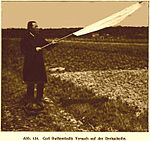Carl Buttenstedt
Christian Heinrich Carl Buttenstedt (born July 29, 1845 in Volkstedt ; † September 20, 1910 in Friedrichshagen ) was a Prussian mountain secretary and dealt with aviation technology, bird flight and natural philosophy as an autodidact .
Life
After his active military service, which he served as a teacher at the military training institute in Weißenfels , Carl Buttenstedt was employed on September 1, 1879 as an office assistant at the royal Prussian salt office in Artern . He married on September 24, 1881. In April 1883 he was promoted to secretary and on May 1, 1883 transferred to the royal Prussian mining office in Dürrenberg with a minimum salary of 1,800 marks. At the same time, Buttenstedt looked after the library of the Salt Office and was used as a registrar. He later worked in Rüdersdorf near Berlin. He also did his aviation studies as an autodidact.
Flight technique
Buttenstedt also worked under the pseudonym A. Werner-Magdeburg on the journal of the German Association for the Promotion of Aviation . He has published numerous articles and books on balloons and theories of gliding . Substantial parts of his writings deal with the discussion with Otto Lilienthal . Since Buttenstedt uses basic physical parameters in his own interpretation, Lilienthal describes him as a "feeling mechanic". Buttenstedt claimed, among other things, that Lilienthal's first successful levitation attempts were a. a. attributed to his personal suggestions.
Buttenstedt's precise observations of bird flight and his theories did not affect flight technique.
Natural philosophy
What is less well known is that Carl Buttenstedt was also active in natural philosophy - esoterically and founded the naturistically oriented "Buttenstedt philosophy of feeling", which can be attributed to the life reform movement around 1900. Especially the Buttenstedt'sche Glücksehe (see also erotic lactation ) became well known for a short time at the beginning of the 20th century, because a contraceptive method was described in the corresponding writing in which the husband should suck milk from his wife's breast several times a day, around the monthly Rule to a halt. This type of contraception is known today as the " lactation menorrhea method " without being associated with Buttenstedt. Buttenstedt's book "Glücks-Ehe" was banned in 1938 in all editions.
The magazine Deutsch-Hellas , which appeared in 1907/08, was inspired by his “philosophy of sensation” .
Buttenstedt was completely forgotten during the time of National Socialism .
literature
- Friedrich Dörge: Buttenstedt, Carl. In: New German Biography (NDB). Volume 3, Duncker & Humblot, Berlin 1957, ISBN 3-428-00184-2 , p. 80 ( digitized version ).
Individual evidence
- ↑ LHASA, MD, F 47, No. 11
- ^ Carl Buttenstedt: The mechanical principle of flight . Vienna 1891
- ^ Carl Buttenstedt: The flight principle. A popular scientific nature study as a basis for the solution d. Flight problem . Berlin 1892
- ^ Carl Buttenstedt: Mechanics, Aviation, Time and Money . 1893
- ↑ Carl Buttenstedt: The flight secret of the air medium . 1894
- ^ The magazine Hellas or Deutsch Hellas , (Ed. Hermann Dames) appeared at least 1907-08
- ↑ Carl Buttenstedt: Our determination !: a nature study . 1900
- ↑ Roland Schöbl: The "happiness marriage" of Carl Buttenstedt. The breastfeeding of the husband as a secret doctrine around 1900 . In: Sexuologie 3–4 / 2007, pp. 117–123. Ed. Academy for Sexual Medicine and Society for Practical Sexual Medicine, Elsevier Verlag. Available as a PDF at www.archive.org .
- ↑ Carl Buttenstedt: The happy marriage: The revelation in the woman - a study of nature. Available as a PDF at www.archive.org .
- ↑ Universal Lexicon of Moral History and Sexology, Institute for Sexual Research Vienna 1928–1932
- ^ List of banned authors during the National Socialist era , as of December 31, 1938
| personal data | |
|---|---|
| SURNAME | Buttenstedt, Carl |
| ALTERNATIVE NAMES | Buttenstedt, Carl Christian Heinrich (full name); Werner-Magdeburg, A. (pseudonym) |
| BRIEF DESCRIPTION | German aviation pioneer |
| DATE OF BIRTH | July 29, 1845 |
| PLACE OF BIRTH | Volkstedt near Eisleben , Province of Saxony , Kingdom of Prussia |
| DATE OF DEATH | September 20, 1910 |
| Place of death | Friedrichshagen , Province of Brandenburg , Kingdom of Prussia , German Empire (today: Treptow-Köpenick , Berlin ) |

